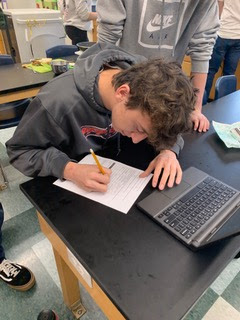--by Annika
This week in class we learned how to ferment vegetables so we can make them last longer and enjoy them as pickles! The hope is that when we have large yields of vegetables in the upcoming seasons we will know how to do this process so we can save them and enjoy them for a long time and it is specifically good if you have a super big excess of vegetables and they will go bad because you can't eat or store them all at once which makes fermenting vegetables the perfect solution. We started on tuesday with a slide show learning about the fermentation process from our teacher Mr. Stewart. He told us that fermentation occurs from the bacteria lactobacilli which are pretty much everywhere and when introduced to the perfect environment through making a brine they ferment and essentially pickled vegetables. We were sent home with the homework to bring in a jar and hard vegetables that we wanted to pickle the next day and out of excitement, a lot of people participated in the optional fun project some people even bringing in special spices and mustard seeds and really getting into creating unique recipes. We started the day out on the farm surrounding a table where mr stewart showed us how to create the brine for the lactobacilli which consisted of seven cups on water and seven tablespoons of salt. Then we were set free to start cutting up our veggies and add in the brine any spices we wanted to mix and apple cider vinegar to promote the entrance of lactobacilli. The jars turned out beautifully and it was a super fun project to save vegetables. I can't wait to taste my homemade pickles in a few weeks!








